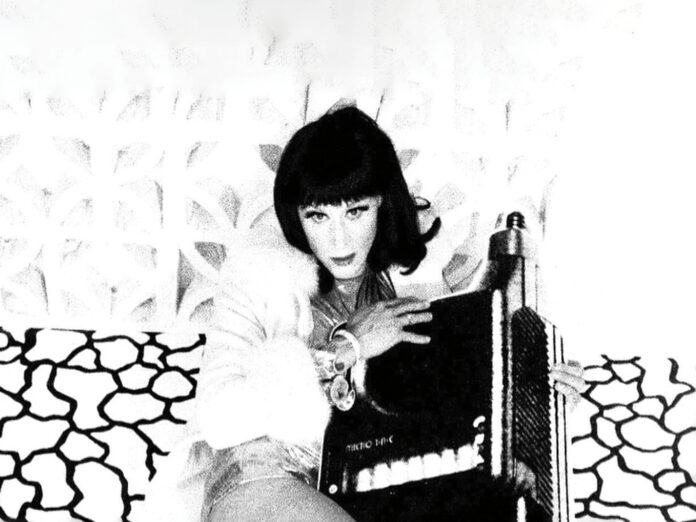Retaining mystery in the digital age is a difficult thing. And even more difficult in this time of over-saturation is releasing a record through entirely unconventional means and having it make a dent, let alone a meaningful impact. On Diamond Jubilee – the seventh album from Patrick Flegel’s alter-ego drag artist persona – Cindy Lee manages to achieve both.
Retaining mystery in the digital age is a difficult thing. And even more difficult in this time of over-saturation is releasing a record through entirely unconventional means and having it make a dent, let alone a meaningful impact. On Diamond Jubilee – the seventh album from Patrick Flegel’s alter-ego drag artist persona – Cindy Lee manages to achieve both.
BRUCE SPRINGSTEEN IS ON THE COVER OF THE NEW UNCUT – ORDER YOUR COPY HERE
This album is not available to buy on any physical format yet. Nor is it on Spotify, Bandcamp or Apple. It is available only to download (for free, with donations encouraged) via the web 1.0 hosting site Geocities or to stream, ad-free, via YouTube. There is no accompanying press or liner notes, no artist bio, no interviews; just a sprawling two-part, two-hour record that has dropped in from nowhere like a parachute from the sky containing precious cargo. Although rather than disappearing into the ether as it lands, ignored by the algorithms, playlists and radio stations who have no access to the tracks to promote it, the album has instead landed to fervent hype.
Although, remarkably, such buzz appears genuinely justified. Diamond Jubilee feels like the work of an artist operating at the peak of their powers who is able to harness and crystallise all that potency and charge into a record that, on the surface, should be far too large, messy and stretched out to contain such a cohesive body of work.
Flegel has always shown chops as a songwriter; in their previous band Women they potently blended art-rock with flourishes of both pop and noise, while their previous records as Cindy Lee have shown promise by equally straddling the lines between experimentation and accessibility. However, Diamond Jubilee sounds like a record on which everything has come together and moved into another realm.
It blurs genres with glee, gliding between ’50s doo wop, ’60s girl groups, psychedelic pop and lo-fi indie, all delivered with a woozy, dreamy, occasionally crepuscular tone. “Always Dreaming” sounds like new-age dream-pop filtered through a busted four-track; “Demon Bitch” comes across as exactly the kind of thing you’d be delighted to hear on an album of outtakes from the self-titled Velvet Underground album, while “Glitz” recalls early Tame Impala if they really amped up the glam but wound down the production.
There is an inescapable feeling of duality to the record, in that it feels tender yet raw, immersive yet fractured, varied yet coherent. Given that Cindy Lee is a drag persona of Flegel, it’s not too much of a stretch to suggest that they are someone who is in a prime position to inherently understand the psychology, nuances and expressive capabilities of having, and exploring, dual identities and personalities. While there is not a stark night and day difference between the two parts of the album, there is a shift in shade, a subtle tweaking that seems to unlock another side to Cindy Lee. Tracks like “Gayblevision” feel like moving from the bedroom to the nightclub, as synths shimmer and an almost 1980s darkwave sheen moves in, completely shifting the tone, pace and punch of the album. These dualities often exist within single songs too. “What’s It Going To Take” feels like it owes as much to the bucolic and progressive sounds of the Canterbury Scene, as it does to avant-funk and bedroom pop. The vocals – as is generally the case throughout the record – are sparse, ethereal and minimal, often feeling more like a ghostly presence that swings by from time to time than a constant narrator.
But ultimately, where Cindy Lee thrives is not necessarily existing in one particular place or genre – or part of the album – but existing in the in-between, operating in blurred lines, misty shadows and the cracks. There is an inherently dreamy, almost Lynchian quality to this record that allows for a deeply and richly immersive listen that seems to float endlessly between varied places while losing little of its flow. Which is all the more impressive to achieve over a whopping 32 tracks.
While tonally, structurally and thematically it’s vastly different, there is something of a similar feeling and result here to The Magnetic Fields’ classic 69 Love Songs. Both manage the incredibly difficult feat of feeling vast and scattered across bountiful tracks, yet also complete, connected and the embodiment of a songwriter capable of tapping into a broad range of music seemingly on a whim.
Diamond Jubilee is a rare beast of an album in many ways. A genuine bolt out of the blue wrapped in mystery that unfurls with unpredictable dream-like logic. Everything about it – from its production to its delivery – feels distinctly analogue and from another era, adding to its almost alien-like landing. Here, Cindy Lee has managed to buck just about every trend, convention and expectation of what releasing music in the digital age is supposed to look and like. And, even more crucially, it sounds just as refreshing.



